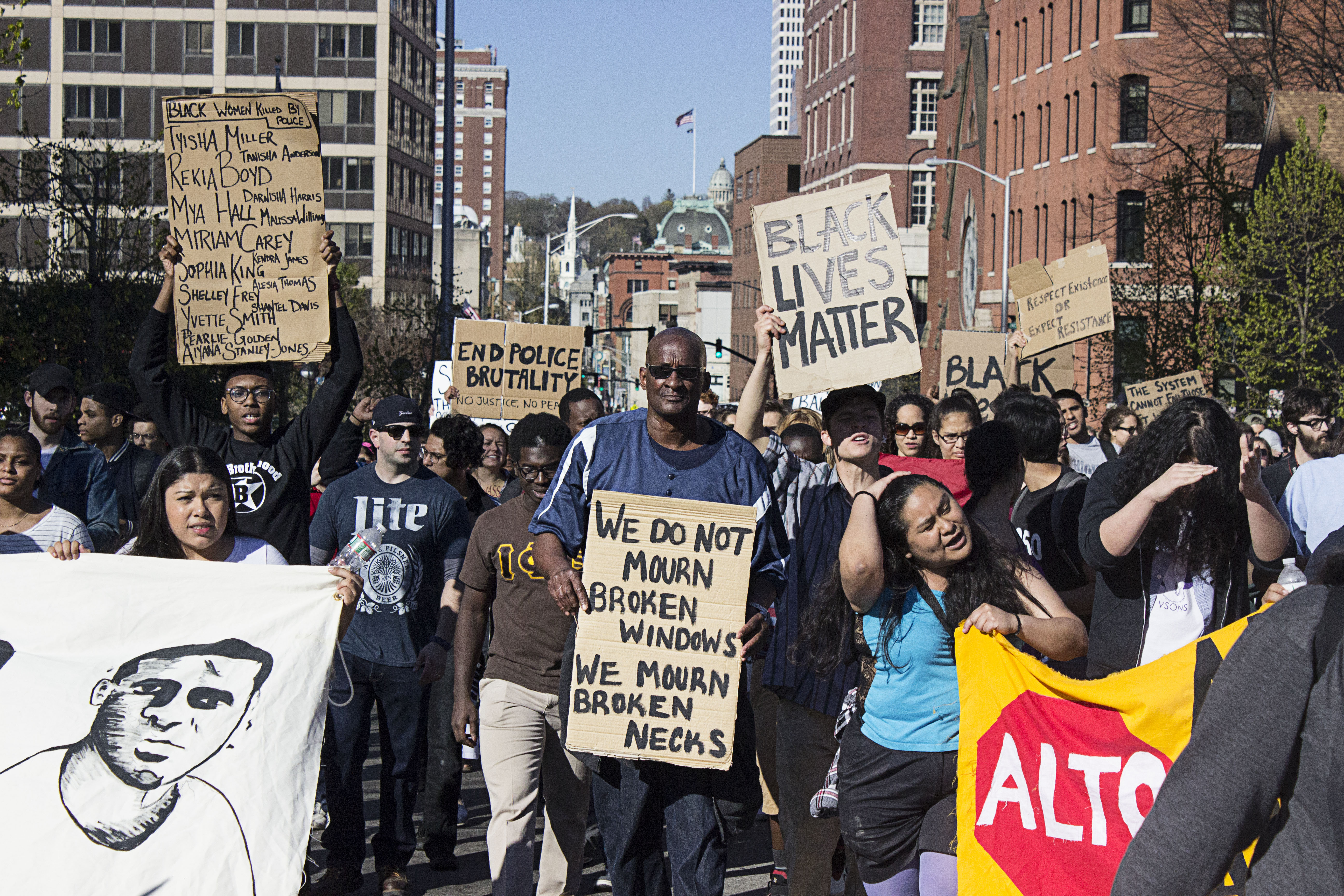Rhode Islanders march in solidarity with Baltimore
To listen to the radio story, check out http://bit.ly/1CpnVzy. This story was reported and produced by Mariela Mannion and Tomas Navia. Photography by Kenneth Lusk. Last Saturday, May 2nd, around 500 Rhode Islanders came together in front of Classical High School in downtown Providence in solidarity with...
To listen to the radio story, check out http://bit.ly/1CpnVzy. This story was reported and produced by Mariela Mannion and Tomas Navia. Photography by Kenneth Lusk.
Last Saturday, May 2nd, around 500 Rhode Islanders came together in front of Classical High School in downtown Providence in solidarity with the protesters in Baltimore. The protesters peacefully marched through Downcity to the Direct Action for Rights and Equality headquarters, demanding justice for the death of Freddie Gray and to spark a conversation about policing practices in Rhode Island.

It was one of the first warm days of the year, a sign that the brutal winter was finally giving way to spring. The In Downcity Cinco de Mayo block party was in full swing, with college students, young families, and elderly couples enjoying live music and feasting on tacos from multiple food trucks.
Not too far away, another group was forming in front of Classical High School, comprised of community activists, college students, and other Rhode Island residents.
“The main purpose is essentially twofold. It’s to stand and march in solidarity with folk in Baltimore. The second thing connected to that is to let community members here in Providence know that the community is aware of the issues that they are facing around police aggression, that we are out in the streets paying attention and we are trying to organize to have what we call a democracy,” said Marco McWilliams, one of the community organizers behind the protest.

As the small gathering of people began to grow, McWilliams greeted newcomers and handed them sheets of paper with the printed text of protest chants. College students held cardboard signs with the rallying call “Black Lives Matter” printed in bold, black sharpie. An elderly white man holding hands with his wife wore a sign around his neck proclaiming “You ask me Why I care? I wonder why you don’t.”

The protest organizers were demanding the end of police aggression towards people of color, a problem that McWilliams said persists in Providence.
“We certainly don’t have the scale of the acute aggression that we see in these places like Baltimore and Ferguson, but any urban center where you have communities of color and police together there’s a long history since ever there was a thing called a police, of police being violently, overly aggressive, and hyper policing,” McWilliams said.
“So that’s in Providence, that’s all around the country. This is national thing and this is just a Providence contingent.”
As more people arrived so did the police, some in riot gear, the majority standing at a distance looking on. One police officer, Captain Oscar Perez, walked through the crowds, shaking hands with community members. He was there to ask about the protest route to prepare for the traffic issues that would surely arise.

Perez oversees the night division and handles quality of life and crime issues in the South Side of Providence. An immigrant originally from Colombia, he has been on the force for 21 years. According to Perez, Providence’s police department is racially diverse, and while he admits no community is perfect, he believes that the police department and the community have a good relationship.
“We have a lot of partners in the community, we have a lot of partnerships we’ve created over the years. I’m a district commander myself, and I was just speaking to several members of the organization. I think the partnership is great, and I hope it continues to be,” said Perez.
“We are mostly here today more than anything just to provide assistance and to make sure that they peacefully protest and that we can keep them safe.”
But, the relationship between the police department and the minority community is the cause of concern for McWilliams and others at the protest.

“The key problem is the fundamental relationship that the police has with the community of color. And that’s really what we’re calling for that needs to change, the fundamental relationship, not just more black police officers, not just that they need to be nicer, but the way in which they relate with the community needs to fundamentally change,” said McWilliams.
This belief is reflected by Morgan Victor, one of the speakers at the march who demanded that black voices be heard, including the often-silenced voices of minority women and LGBTQ people. Victor believes that the community cannot rely on the police to change their practices.
“I think that it’s a matter of coming together and figuring out alternatives, not necessarily to fight against the cops, but be able to figure out ways that we can hold ourselves accountable with the community members coming together rather than relying on people who are afflicting that violence on our neighborhoods,” said Victor.
“It really comes down to the residents coming together and talking about different ways that can work for us. Not expecting them to develop ways that will work for us.”

She stressed that there is a deep mistrust between the minority community and the police.
“I don’t think there is any type of relationship between the two, I don’t think there needs to be one necessarily, but I do know the relationship is very hostile, intense, because of the racial profiling here, because we have the ‘jump out’ boys here, because of harassment,” Victory said. “A lot of Providence residents don’t even realize that there’s a smaller unit of the police that was designated to basically stop and frisk, but they can’t call it that. There are people who are unmarked, they aren’t in uniform, they’re in unmarked cars and they can jump out at any point at any resident in Providence and frisk them to search for weapons. Apparently this is what they are looking for to take guns off of the streets,” said Victor.
Major Thomas Verdi, Captain Oscar Perez’s supervisor declined to comment about the “jump out boys.” The American Civil Liberties Union recently published a study showing the deep racial disparity in arrest rates in many Rhode Island neighborhoods, a disparity even more divided than in Ferguson, Missouri. Rhode Island police departments arrested black individuals on average 9.14 times higher than for non-blacks.
The march proceeded without incident, with police officers walking alongside protesters through the streets. While these community members say the issue of policing in Rhode Island is far from resolved, they are demanding action rather than passive acceptance.


